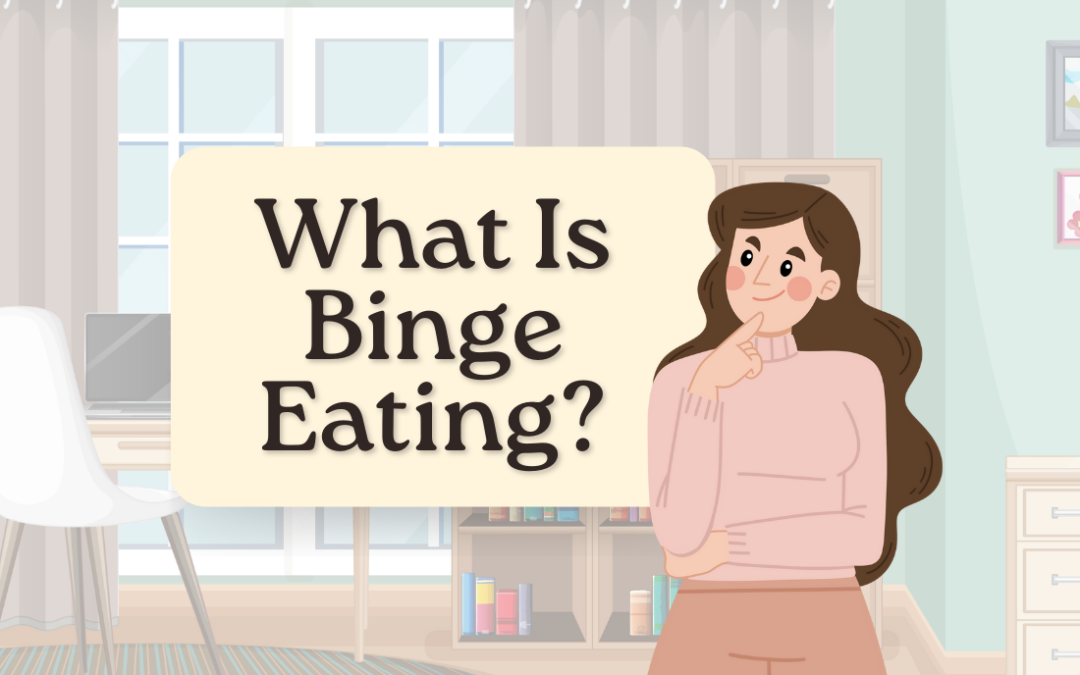Binge eating is characterized by consuming an unusually large amount of food in a short period, often accompanied by a compulsive feeling or loss of control.
Written by Jenn Hand, Holistic Nutritionist, Board Certified Health Coach, NBC-HWC, Binge Eating Coach
What Is Binge Eating?
Binge eating refers to consuming a large amount of food in a short period, often accompanied by a compulsive feeling and loss of control.
Binge episodes are usually marked by eating faster than normal, eating until uncomfortably full, eating large amounts of food when not physically hungry, eating alone due to embarrassment, and feeling disgusted, depressed, or guilty afterward.
Table of Contents
- Why I Don’t Like the Term “Binge Eating Disorder” or “Disordered Eating”
- My Story: Why I Started Binge Eating and How I Stopped
- What Does Binge Eating Look Like?
- What Causes the Urge to Binge Eat?
- Why Do Some People Binge Eat and Other Do Not?
- How You Can Help Someone Who Is Binge Eating
- How You Can Help Yourself If You’re Binge Eating Frequently
- How Common is Binge Eating?
- How Does Binge Eating Affect a Woman’s Health?
- What is the Difference Between Binge Eating and Other Eating Disorders?
- How Do You Recover from Binge Eating?
- Does Diet Culture Cause Binge Eating?
- Working with a Professional: Therapy vs. Food Relationship Coaching
- Common Questions People Ask Me about Binge Eating
- Common Questions People Ask Online about “Binge Eating Disorder”
- My Top Binge Eating Resources
Why I Don’t Like the Term “Binge Eating Disorder” or “Disordered Eating”
Many people struggle with food. But often, their behavior can’t be labeled and put into a defined box.
In my own journey, I binged, restricted, emotionally ate, and battled my weight and body image. Most of the women I work with can’t be put into a specific category for what they are struggling with.
I try to avoid defining someone’s struggle, as I think it can be unhelpful and limiting in how we heal.
The labels “binge eating disorder” or “disordered eating” also carry negative connotations and stigma. This can cause people to feel criticized or judged, which may hinder healing.
I’m a big believer in a holistic approach that focuses on understanding and addressing the underlying causes of eating behaviors without attaching labels.
My Story: Why I Started Binge Eating and How I Stopped
My own battle began when I was a junior in high school.
I had gained some weight and decided I wanted to “look good” for the upcoming school prom. Looking good to me equaled losing 20 pounds, so I decided to buy diet pills.
In my mind, this was a harmless plan.
I would just “not eat a lot,” take diet pills, and get skinny so I could wear the dress I wanted.
I exercised a ton, ate nothing but fruit for breakfast, peppers and ranch dip for lunch, and a light dinner, and took the diet pills. I quickly lost weight and started getting a ton of comments about how good I looked. Associating being thin with attention from guys, comments from friends, and a feeling of elation at buying smaller clothes, I entered the rabbit hole spiral of my 13-year battle with the binge and restrict cycle.
Any form of restriction will always lead to bingeing, and my own diet pill plan was no different.
Post-prom, I began bingeing.
I couldn’t stop eating and felt wildly out of control. I kept taking more and more diet pills in the hopes that I could “get back to” the weight I was before.
My weight gain and loss swings were extreme.
I’d lose weight but gain more back when I stopped restricting.
Thankfully, in college, I began to get help with this cycle and worked to start normalizing my eating.
I worked 1:1 with a woman who changed my life.
We worked to normalize my blood sugar, let go of food rules, normalize my energy levels, listen to my body, gain confidence in trusting my body and her needs, be with my emotions, and so much more.
This journey was a wild ride.
It was not at all a linear path, but each lesson I learned helped me to go deeper in my own healing of being a “normal” eater.
What Does Binge Eating Look Like?
Binge eating typically involves consuming excessive amounts of food quickly and feeling a loss of control during the episode.
It often happens in private, with individuals eating far beyond the point of fullness. This behavior is frequently followed by intense feelings of shame, guilt, and distress, leading to a vicious cycle of binge eating and emotional turmoil.
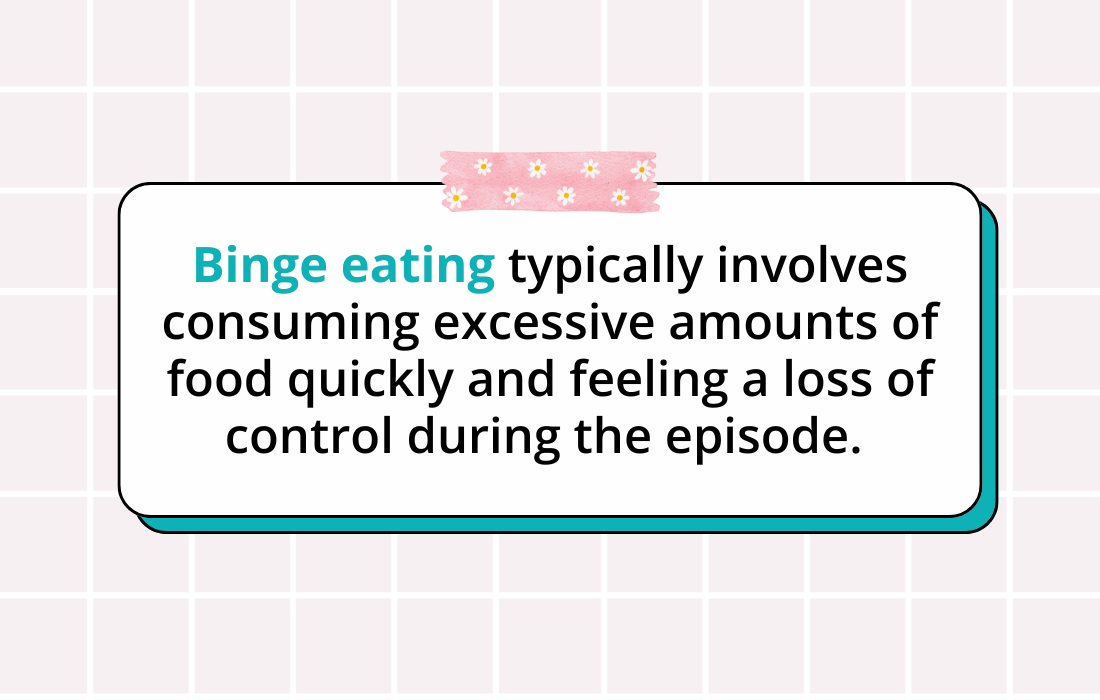
What Causes the Urge to Binge Eat?
The urge to binge eat can be caused by a variety of factors, including:
- Emotional triggers: Stress, anxiety, depression, and other negative emotions can cause us to turn to food as a way to cope.
- Restriction: Restrictive diets can lead to intense cravings and eventual bingeing when the body’s need for nutrients and energy becomes overwhelming.
- Physiological factors: Hormonal imbalances and brain chemistry can play a role, with certain neurotransmitters affecting appetite and mood.
- Habit and learned behaviors: Past experiences and learned behaviors around food can contribute to binge eating patterns.
Why Do Some People Binge Eat and Other Do Not?
The difference in susceptibility to binge eating can be attributed to a combination of emotional and environmental factors.
People with a history of trauma or emotional distress or those who have engaged in restrictive dieting are more likely to develop binge eating behaviors.
Conversely, people without these risk factors may not experience the same urges or behaviors.
It depends on many factors.
I’ve found that the women I’ve worked with (including myself) usually did not learn how to deal with emotions growing up and use bingeing as a way to cope with life.
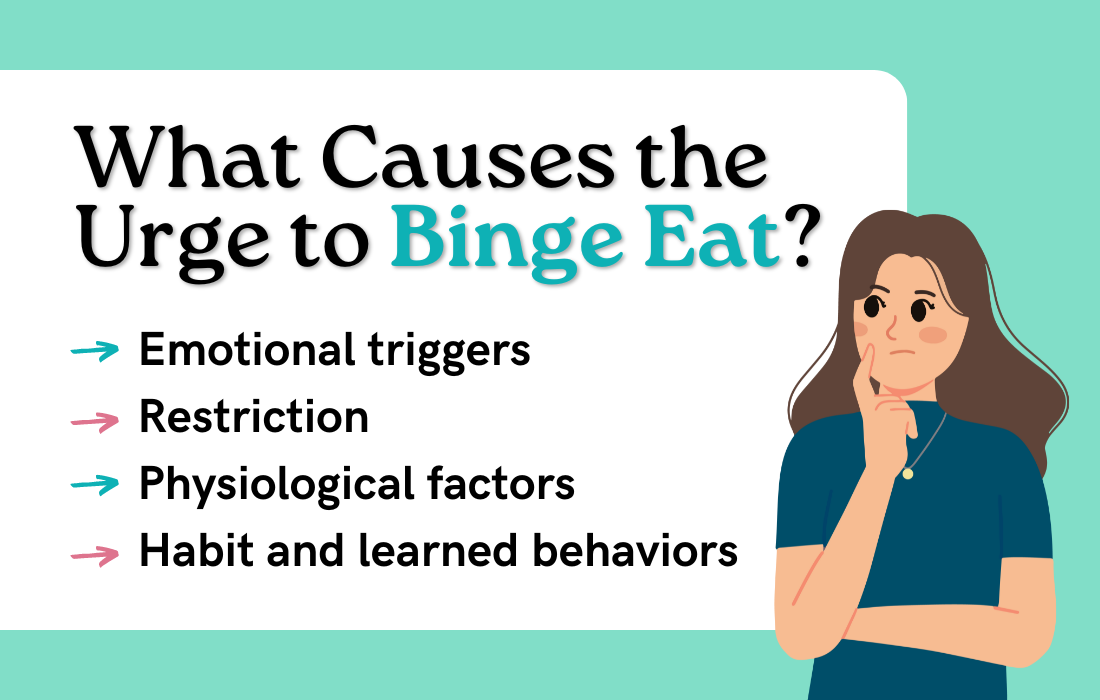
How You Can Help Someone Who Is Binge Eating
To support someone who is binge eating, it’s important to approach them with empathy and without judgment. Be open, kind, and supportive.
If it’s appropriate, encourage them to seek professional help from therapists or coaches specializing in bingeing. Providing a listening ear and avoiding critical comments about their eating habits can also be supportive.
How You Can Help Yourself If You’re Binge Eating Frequently
I take a holistic approach to healing binge eating–working to address the physical, mental, emotional and spiritual sides of ourselves.
They are all interconnected and play a role in healing from binge eating. To help yourself if you’re binge eating frequently, consider these strategies:
- Journaling: Keep track of your emotions and triggers to better understand your bingeing patterns.
- Practicing Kindness: Shift from self-criticism to self-compassion.
- Eating Regularly: Focus on balanced meals to maintain steady blood sugar levels throughout the day.
- Engaging in Gentle Exercise: Activities like walking can improve your mood and overall well-being.
How Common Is Binge Eating?
Binge eating is quite common, affecting a significant portion of the population. It’s the most prevalent eating disorder in the United States, with around 2.8% of adults experiencing it in their lifetime. (+)
How Does Binge Eating Affect a Woman’s Health?
Binge eating can have various negative effects on a woman’s health, including weight gain and digestive issues. It also has psychological impacts, such as increased anxiety, depression, and low self-esteem.
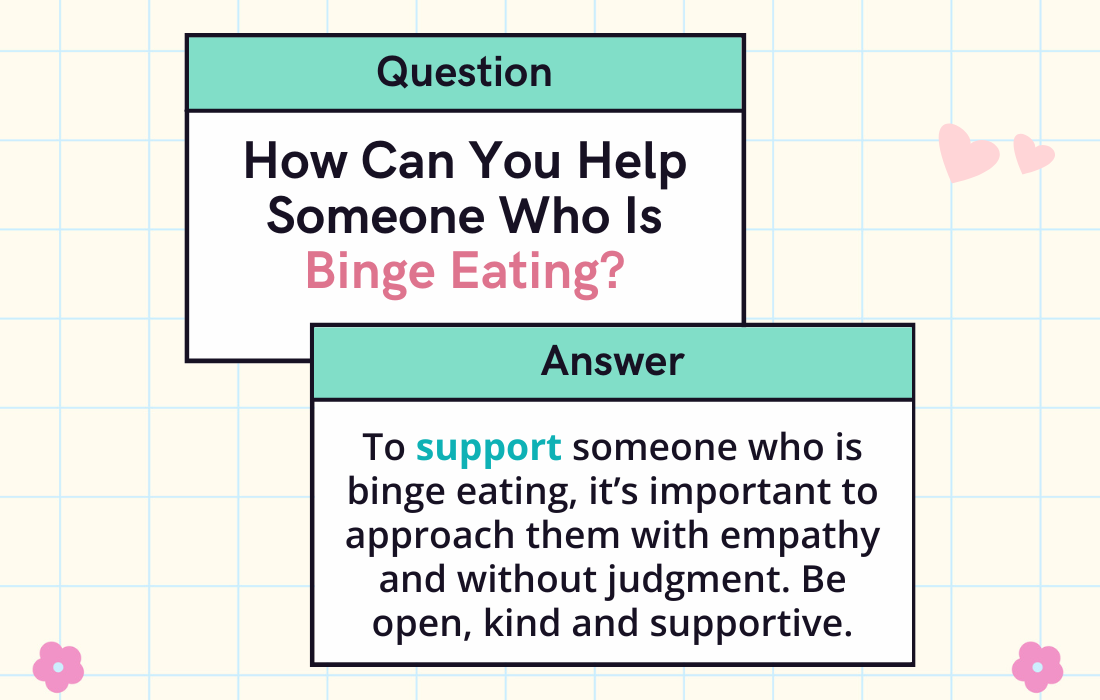
What is the Difference Between Binge Eating and Other Eating Disorders?
Binge eating differs from other eating disorders like bulimia nervosa and anorexia nervosa primarily in that there are no compensatory behaviors (e.g., purging, excessive exercise) after a binge episode.
While bulimia involves bingeing followed by purging, binge eating disorder involves episodes of eating large quantities of food without subsequent purging.
How Do You Recover from Binge Eating?
Recovery from binge eating involves:
- Addressing Emotional Triggers: Working through underlying emotional issues with a coach or therapist.
- Practicing Self-Compassion: Being kind to yourself and avoiding self-criticism.
- Rejecting Diet Culture: Embracing intuitive eating and rejecting restrictive diets.
- Seeking Professional Help: Engaging with therapists or coaches who specialize in eating disorders.
Does Diet Culture Cause Binge Eating?
Diet culture can significantly contribute to binge eating by promoting restrictive eating patterns and negative body image.
I’m a big advocate of learning to find your “normal” around food, working to let go of restrictive diets, and focusing on intuitive eating, which helps in fostering a healthier relationship with food and reducing bingeing behavior.
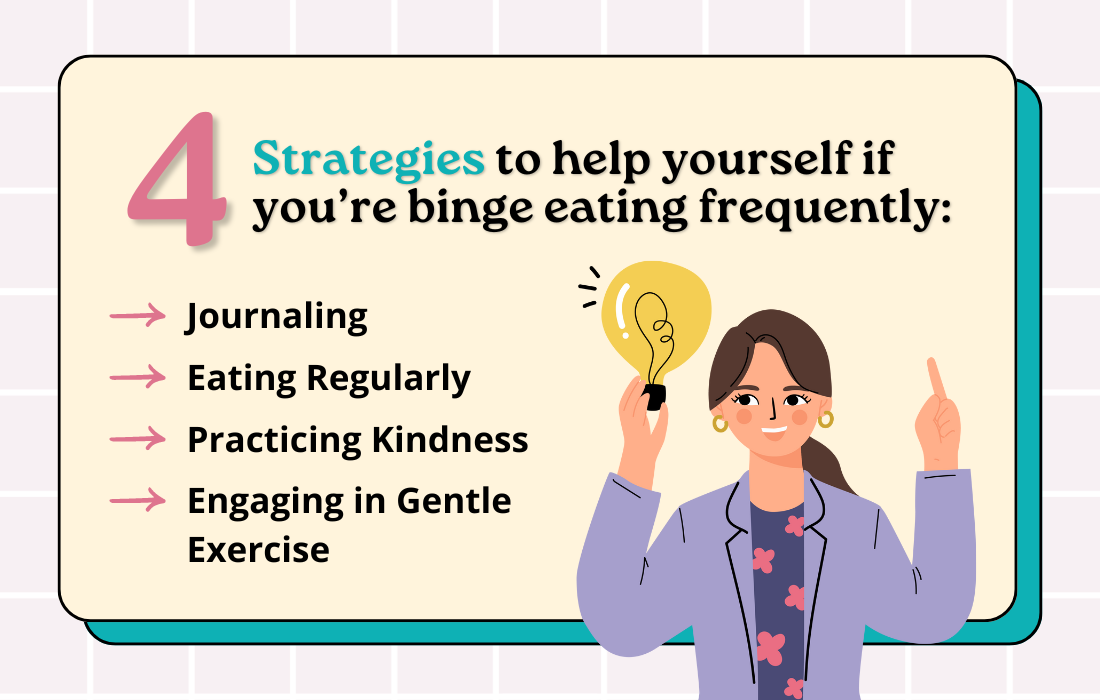
Working with a Professional: Therapy vs. Food Relationship Coaching
Both therapy and food relationship coaching can be beneficial for overcoming binge eating.
Therapy often delves into underlying psychological issues and emotional triggers, while food relationship coaching focuses on practical strategies to build a healthier relationship with food and your body. Each method can provide valuable tools, and often, a combination of both yields the best results.
🍏 Get the After-Binge Toolkit 🧰
If you want additional support, I’ve created an After Binge Toolkit to help you recover.
Common Questions People Ask Me about Binge Eating
Is binge eating genetic?
Studies suggest that genetics may play a role in the development of binge eating disorder (BED).
Research has shown that individuals with a family history of eating disorders are at a higher risk of developing BED themselves. Genetic factors can influence brain chemistry, particularly the regulation of hunger, satiety, and mood, which can contribute to binge eating behaviors.
In reality though, a lot of binge eating is a result of how we grow up, what we’ve learned around food/weight and body, and how we learn to take care of ourselves physically, mentally, emotionally and spiritually.
Why do most people binge eat?
Most people binge eat due to a combination of emotional, psychological, and environmental factors.
Common reasons include:
- Emotional distress: Individuals often binge eat to cope with negative emotions such as stress, anxiety, depression, or loneliness.
- Dieting and restriction: Strict dieting and food deprivation can lead to episodes of binge eating when the body craves energy and nutrients.
- Psychological factors: Low self-esteem, body dissatisfaction, and a history of trauma or abuse are associated with binge eating.
- Environmental triggers: Accessibility to large amounts of food, social pressures, and cultural attitudes toward food and body image can also contribute to binge eating
What gender is most likely to binge eat?
Binge eating disorder affects both men and women, but it is more common in women. Studies indicate that women are about twice as likely as men to experience binge eating disorder.
What percentage of people deal with binge eating?
Binge eating disorder is the most common eating disorder in the United States.
It affects about 1.25% to 3.5% of women and 0.42% to 2% of men at some point in their lives. Overall, it’s estimated that around 2.8% of adults will experience binge eating disorder during their lifetime .
What age group are most likely to binge eat?
Binge eating can occur at any age, but it most commonly begins in late adolescence or early adulthood.
However, it can also start later in life. Adolescents and young adults are particularly vulnerable due to the pressures of body image and societal expectations. Most of the women I’ve worked with have been in the 30’s, 40’s and 50’s–so it affects people of all ages.
Is bulimia nervosa related to binge eating?
Yes, bulimia nervosa is related to binge eating but differs in significant ways.
Both disorders involve episodes of eating large quantities of food in a short period. However, individuals with bulimia nervosa engage in compensatory behaviors such as vomiting, excessive exercise, or misuse of laxatives to prevent weight gain after binge eating. In contrast, binge eating disorder does not involve these compensatory behaviors.
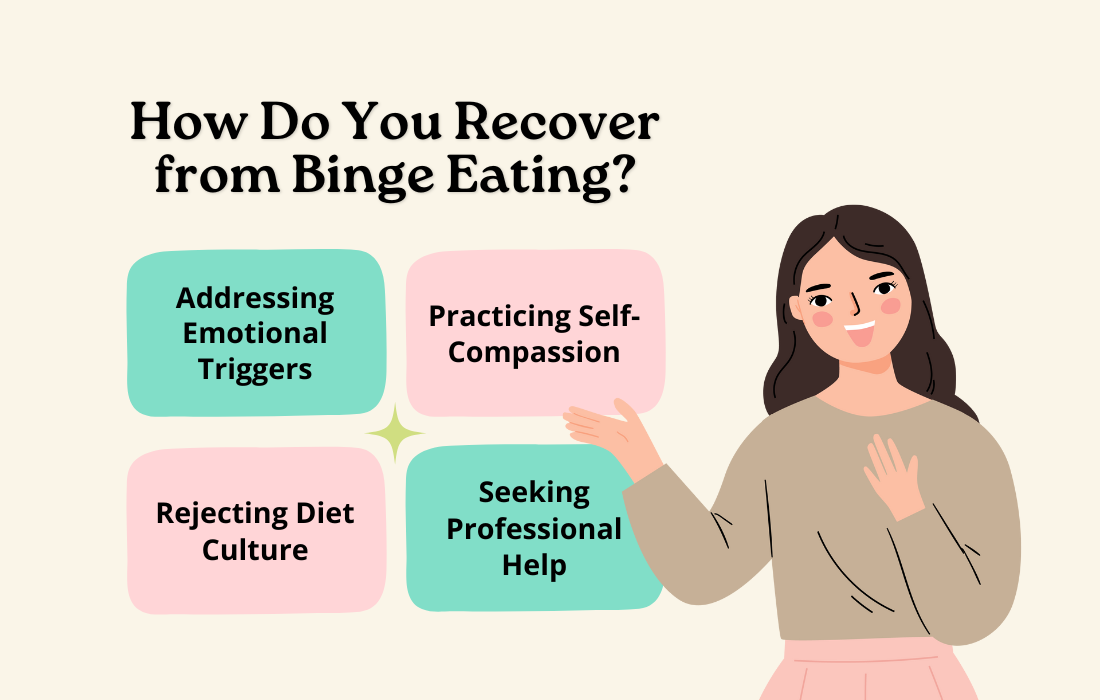
Common Questions People Ask Online about “Binge Eating Disorder”
How is binge eating disorder diagnosed?
Binge eating disorder is diagnosed through clinical evaluation, including interviews and questionnaires assessing eating habits, behaviors, and associated psychological distress.
What are the symptoms of binge eating?
Symptoms include eating large amounts of food in a short period, feeling out of control during binges, and experiencing guilt or shame afterward.
What are some challenges that people with binge eating tendencies experience?
Challenges include weight gain, health complications, emotional distress, and difficulty managing daily responsibilities due to preoccupation with food.
What is the most common way to treat binge eating disorder?
The most common treatment involves a combination of cognitive-behavioral therapy (CBT), medications, and nutritional counseling.
Is binge eating disorder treated by a doctor?
Yes, it is often treated by a multidisciplinary team including doctors, psychologists, and dietitians.
How does a person develop binge eating disorder?
Development is influenced by genetic, psychological, and environmental factors, including stress, dieting, and body image dissatisfaction.
How do doctors diagnose binge eating disorder?
Doctors diagnose it using criteria from the Diagnostic and Statistical Manual of Mental Disorders (DSM-5) and comprehensive patient history.
Is developing binge eating disorder a gradual thing?
Yes, it typically develops gradually, often starting with occasional overeating episodes that become more frequent and severe over time.
How does binge eating disorder influence eating behavior?
It leads to irregular eating patterns, loss of control over food consumption, and a preference for high-calorie, low-nutrient foods.
Can binge eating disorder be successfully treated?
Yes, with appropriate treatment, many individuals experience significant improvement and can manage symptoms effectively.
What factors contribute to the development of binge eating disorder?
Factors include genetics, emotional trauma, cultural pressures, and chronic dieting.
What are the early signs of developing binge eating disorder?
Early signs include frequent episodes of eating large amounts of food, eating when not hungry, and feeling distressed about eating habits.
My Top Binge Eating Resources
I have a ton of resources to help you overcome binge eating. Some of my favorites include:
1. Video Training: The 4 Pillars to Overcome Binge and Emotional Eating: This four part video series focuses on addressing the holistic aspects of binge eating, including physical, mental, emotional, and spiritual components. It helps you understand why you binge eat and provides strategies to break the cycle.
2. How to Stop Binge Eating: I share my own personal journey and struggle and what helped me to stop binge eating. This blog post provides practical advice and insights on overcoming binge eating through a compassionate and holistic approach.
3. Podcast: Cake Doesn’t Count: My podcast covers various topics related to binge eating, emotional eating, and finding food freedom. I share real life stories and short, practical tips to help you in your day to day healing.
Related Articles
⚪ What Role Does Nutrition Play in Recovering From Binge Eating?
⚪ Why Do I Binge On Sugar?
⚪ What To Do After Binge Eating Sugar
⚪ What Are the Most Common Misconceptions about Binge Eating?
Get the Normal Eater’s Newsletter
Join 8000+ women who are overcoming overeating, binge eating, and breaking up with dieting forever. Get Jenn’s inspiring and actionable weekly newsletter with the latest posts, podcasts, and tips on how to love your body, find food freedom, and lose weight holistically.
Get the Normal Eater’s NewsletterWork with an Emotional Eating & Holistic Nutrition Coach
Overcome Bingeing and Emotional Eating, and Break Up with Yo-yo Dieting
Working with an emotional eating coach and holistic nutritionist can help you get free from the frustrating binge and restrict cycle and stop yo-yo dieting.
You don’t have to be obsessed with food or have a million rules around eating to find your natural weight and learn to love your body. Ready to actually see a lasting change and experience true freedom?
Schedule a 20-min CallAbout the Author:

Jenn Hand has been helping women like you become normal eaters since 2015.
She’s worked with thousands of women, helping them to balance their bodies, end bingeing, stop obsessing over food, and start feeling amazing again. As a board-certified health coach and holistic nutritionist, Jenn knows how to support you in making real positive changes that last.
Her articles have been published on Mind Body Green, Tiny Buddha, Thrive Global and other local and global media platforms. She’s the author of How to Be a Normal Eater and the creator of The Normal Eater’s Club program. Listen to Jenn’s advice and tips on the Cake Doesn’t Count Podcast, or read more of her articles for free on the Food Freedom Blog.
Learn About Coaching!
